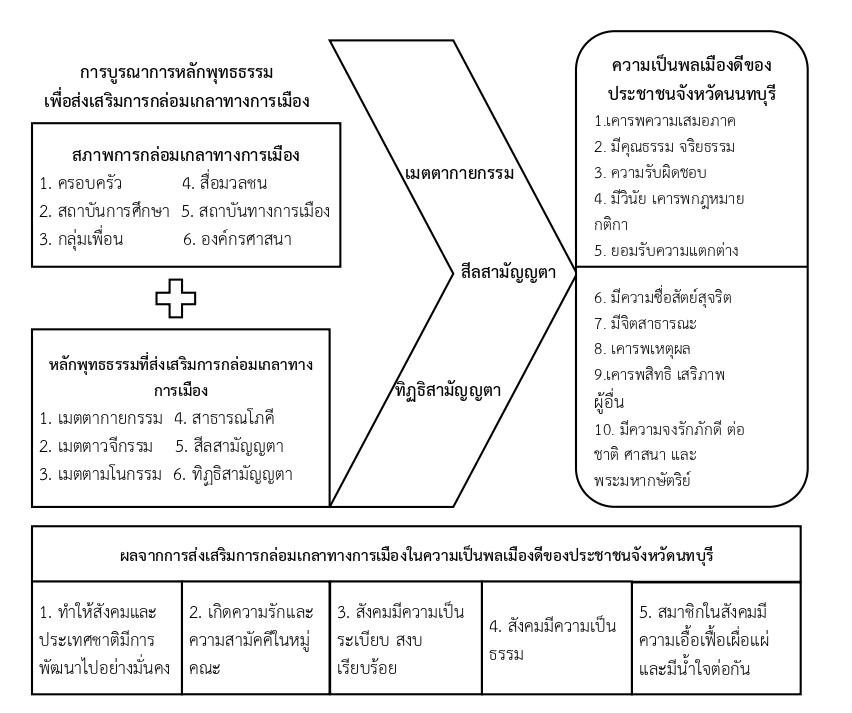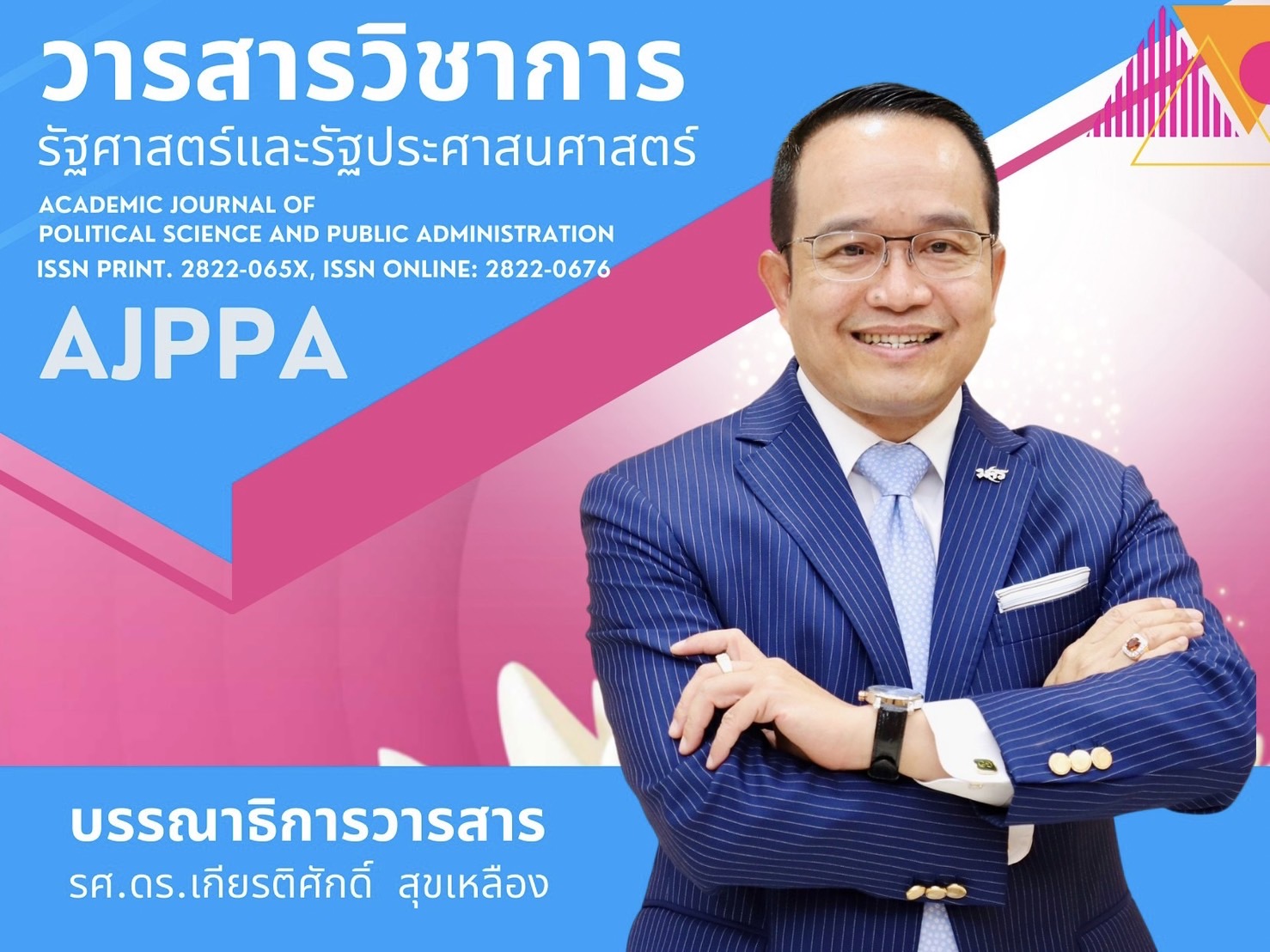ปัจจัยที่ส่งผลต่อการกล่อมเกลาทางการเมืองในความเป็นพลเมืองดี ของประชาชนจังหวัดนนทบุรี
คำสำคัญ:
ปัจจัยที่ส่งผล , การกล่อมเกลาทางการเมือง, ความเป็นพลเมืองดีบทคัดย่อ
บทความวิจัยนี้มีวัตถุประสงค์คือ 1. เพื่อศึกษาความเป็นพลเมืองดีของประชาชนจังหวัดนนทบุรี 2. เพื่อศึกษาปัจจัยที่ส่งผลต่อการบูรณาการหลักพุทธธรรมเพื่อส่งเสริมการกล่อมเกลาทางการเมืองที่ส่งผลต่อความเป็นพลเมืองดีของประชาชนจังหวัดนนทบุรี เป็นการวิจัยแบบผสานวิธี การวิจัยเชิงคุณภาพ เก็บรวบรวมข้อมูลโดยการสัมภาษณ์แบบกึ่งโครงสร้างกับผู้ให้ข้อมูลสำคัญ จำนวน 20 รูปหรือคน และการสนทนากลุ่มเฉพาะจำนวน 10 รูปหรือคน วิเคราะห์ข้อมูลโดยการวิเคราะห์เนื้อหาเชิงพรรณนา และการวิจัยเชิงปริมาณ เก็บรวบรวมข้อมูลโดยใช้แบบสอบถามจากกลุ่มตัวอย่างประชาชนจังหวัดนนทบุรี มีอายุตั้งแต่ 18 ปี ขึ้นไป จำนวน 400 คน วิเคราะห์ข้อมูลโดยหาค่าความถี่ ร้อยละ ค่าเฉลี่ย ส่วนเบี่ยงเบนมาตรฐาน และการวิเคราะห์การถดถอยพหุคูณ
ผลการวิจัยพบว่า 1. ความเป็นพลเมืองดีของประชาชนจังหวัดนนทบุรี ประกอบด้วย 10 องค์ประกอบ ได้แก่ 1. ความรับผิดชอบ 2. มีวินัย เคารพกฎหมาย กติกา 3. มีคุณธรรม จริยธรรม 4. เคารพสิทธิ เสรีภาพผู้อื่น 5. ยอมรับความแตกต่าง 6. เคารพความเสมอภาค 7. เคารพเหตุผล 8. มีจิตสาธารณะ 9. มีความซื่อสัตย์สุจริต และ
10. มีความจงรักภักดี ต่อชาติ ศาสนา และพระมหากษัตริย์ โดยรวมอยู่ในระดับมาก มีค่าเฉลี่ยเท่ากับ 4.09 2. ปัจจัยที่ส่งผลต่อการบูรณาการหลักพุทธธรรมเพื่อส่งเสริมการกล่อมเกลาทางการเมืองที่ส่งผลต่อความเป็นพลเมืองดีของประชาชนจังหวัดนนทบุรี พบว่า หลักสาราณียธรรมทั้ง 6 เมตตากายกรรม (แสดงออกต่อกันด้วยความปรารถนาดี) สีลสามัญญตา (มีความประพฤติสุจริตเสมอกับผู้อื่น) และ ทิฏฐิสามัญญตา (มีความเห็นชอบร่วมกับผู้อื่น) ส่งผลต่อความเป็นพลเมืองดีของประชาชนจังหวัดนนทบุรี อย่างมีนัยสำคัญที่ระดับ .01 ได้ร้อยละ 60.2
เอกสารอ้างอิง
กรณัฐ ระงับทุกข์. (2564). การพัฒนาความเป็นพลเมืองในระบอบประชาธิปไตยของประชาชนที่มีผลต่อการเลือกตั้งทั่วไปในกรุงเทพมหานคร (ดุษฎีนิพนธ์ปริญญาปรัชญาดุษฎีบัณฑิต สาขาวิชารัฐศาสตร์). พระนครศรีอยุธยา: มหาวิทยาลัยมหาจุฬาลงกรณราชวิทยาลัย.
กาญจนาณัฐ ประธาตุ. (2560). พระพุทธศาสนากับสังคมไทย : การยืนหยัดและท้าทายในรอบทศวรรษ (พ.ศ. 2548 – 2558). วารสารศิลปะการจัดการ, 1(2), 103 - 118.
จุฑามาศ ช่อคง. (2556). การสร้างแบบวัดความเป็นพลเมืองดีสำหรับนักเรียนระดับชั้นมัธยมศึกษาปีที่ 4-6 สังกัดสำนักงานเขตพื้นที่การศึกษามัธยมศึกษา เขต 18. วารสารวิจัยทางการศึกษา คณะศึกษาศาสตร์ มหาวิทยาลัยศรีนครินทรวิโรฒ. 8(1), 23 - 36.
ชรินทร์ มั่งคั่ง. (2553). การศึกษาเชิงพหุวัฒนธรรมด้านความเป็นพลเมืองดีในสาระการเรียนรู้สังคมศึกษา (รายงานการวิจัย). เชียงใหม่: มหาวิทยาลัยเชียงใหม่.
โชคชัย ศรีรักษา. (2566). การพัฒนาการส่งเสริมการปลูกฝังจิตสำนึกการเมืองการปกครองในระบอบ ประชาธิปไตยแก่เยาวชนจังหวัดลพบุรี (ดุษฎีนิพนธ์ปริญญาปรัชญาดุษฎีบัณฑิต สาขาวิชารัฐศาสตร์). พระนครศรีอยุธยา: มหาวิทยาลัยมหาจุฬาลงกรณราชวิทยาลัย.
พระครูวินัยธรอธิษฐ์ สุวฑฺโฒ (สุขพานิช). (2556). การบูรณาการหลักพุทธธรรมเพื่อส่งเสริมวัฒนธรรมทางการเมืองในระบอบประชาธิปไตยของประชาชนในจังหวัดเพชรบุรี. วารสารพุทธสังคมวิทยาปริทรรศน์, 7(1), 46 - 63.
พระชลญาณมุนี. (2562). พุทธศาสนากับการเมือง. วารสารรัฐศาสตร์ มหาวิทยาลัยราชภัฏสวนสุนันทา, 2(1), 40 - 55.
พระประเสริฐ เตชโก (ชาภักดี). (2566). การสร้างจิตสำนึกของความเป็นพลเมือง ในการตัดสินใจใช้สิทธิ เลือกตั้งสมาชิกสภาผู้แทนราษฎรในจังหวัดพระนครศรีอยุธยา (ดุษฎีนิพนธ์ปริญญาปรัชญาดุษฎีบัณฑิต สาขาวิชารัฐศาสตร์). พระนครศรีอยุธยา: มหาวิทยาลัยมหาจุฬาลงกรณราชวิทยาลัย.
พระมหาหรรษา ธมฺมหาโส (นิธิบุณยากร). (2557). แนวโน้มบทบาทพระสงฆ์กับการเมืองไทยในสองทศวรรษหน้า (รายงานการวิจัย). กรุงเทพฯ: ศูนย์พุทธศาสน์ศึกษา จุฬาลงกรณ์มหาวิทยาลัย.
สายชล สัตยานุรักษ์. (2546). พุทธศาสนากับแนวคิดทางการเมืองในรัชสมัยพระบาทสมเด็จพระพุทธยอดฟ้าจุฬาโลก (พ.ศ. 2325 - 2352). กรุงเทพฯ: สำนักพิมพ์มติชน.
Tomomi T. (2012). Modern Thai Buddhism and Buddhadasa Bhikkhu: A Social History. Singapore: NUS Press.

ดาวน์โหลด
เผยแพร่แล้ว
รูปแบบการอ้างอิง
ฉบับ
ประเภทบทความ
หมวดหมู่
สัญญาอนุญาต
ลิขสิทธิ์ (c) 2024 วารสารวิชาการรัฐศาสตร์และรัฐประศาสนศาสตร์

อนุญาตภายใต้เงื่อนไข Creative Commons Attribution-NonCommercial-NoDerivatives 4.0 International License.




